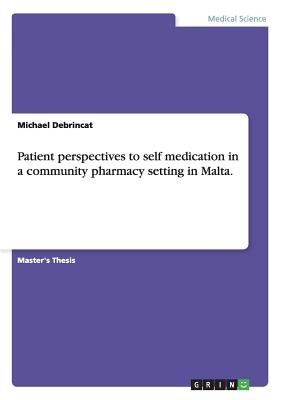
- We will send in 10–14 business days.
- Author: Michael Debrincat
- Publisher: GRIN Verlag
- ISBN-10: 3656546886
- ISBN-13: 9783656546887
- Format: 14.8 x 21 x 0.8 cm, softcover
- Language: English
- SAVE -10% with code: EXTRA
Patient perspectives to self medication in a community pharmacy setting in Malta. (e-book) (used book) | bookbook.eu
Reviews
Description
Master's Thesis from the year 2011 in the subject Medicine - Pharmacology, grade: A, Queen's University Belfast, course: Community Pharmacy, language: English, abstract: Title: Patient perspectives to self medication in a community pharmacy setting in Malta. Objective: To determine the perspectives of patients regarding OTC medication, incidence of irresponsible medication, reasons for, predisposing factors that contribute to, and methods used to reduce these events from occurring. The misuse and abuse of OTC medications was also discussed. Design: Questionnaire of approximately 15 minutes duration administered using a structured interview technique. Setting: National Pharmacy, Hamrun, Malta. Subjects: 200 people above the age of 16 years entering the pharmacy. Results: Three quarters of participants visited a community pharmacy at least once a month and over half of participants (56.5%) reported buying OTC drugs during the same period. Most respondents (85%) preferred seeking advice from a chemist rather than a doctor when their condition was not serious enough to visit the latter. Patients with higher managerial, administrative and professional occupations were more likely to follow the directions on the packet. Patients with manual occupations were more likely to seek the advice of a pharmacist rather than a doctor if a given OTC product did not work within a recommended time period. Only 1% of participants asked for an OTC product that did not correspond with the symptoms they were treating. Three quarters of participants were knowledgeable about the potential for abuse of some OTC drugs and most named analgesics as the most liable for abuse. Almost one third (31.5%) of the participants came across cases of OTC abuse. Conclusion: Participants were positive towards the health care being provided by their local pharmacy. They felt that pharmacists play an important role in providing advice on OTC medicines use. The OTC drug abuse problem needs to
EXTRA 10 % discount with code: EXTRA
The promotion ends in 18d.18:26:33
The discount code is valid when purchasing from 10 €. Discounts do not stack.
- Author: Michael Debrincat
- Publisher: GRIN Verlag
- ISBN-10: 3656546886
- ISBN-13: 9783656546887
- Format: 14.8 x 21 x 0.8 cm, softcover
- Language: English English
Master's Thesis from the year 2011 in the subject Medicine - Pharmacology, grade: A, Queen's University Belfast, course: Community Pharmacy, language: English, abstract: Title: Patient perspectives to self medication in a community pharmacy setting in Malta. Objective: To determine the perspectives of patients regarding OTC medication, incidence of irresponsible medication, reasons for, predisposing factors that contribute to, and methods used to reduce these events from occurring. The misuse and abuse of OTC medications was also discussed. Design: Questionnaire of approximately 15 minutes duration administered using a structured interview technique. Setting: National Pharmacy, Hamrun, Malta. Subjects: 200 people above the age of 16 years entering the pharmacy. Results: Three quarters of participants visited a community pharmacy at least once a month and over half of participants (56.5%) reported buying OTC drugs during the same period. Most respondents (85%) preferred seeking advice from a chemist rather than a doctor when their condition was not serious enough to visit the latter. Patients with higher managerial, administrative and professional occupations were more likely to follow the directions on the packet. Patients with manual occupations were more likely to seek the advice of a pharmacist rather than a doctor if a given OTC product did not work within a recommended time period. Only 1% of participants asked for an OTC product that did not correspond with the symptoms they were treating. Three quarters of participants were knowledgeable about the potential for abuse of some OTC drugs and most named analgesics as the most liable for abuse. Almost one third (31.5%) of the participants came across cases of OTC abuse. Conclusion: Participants were positive towards the health care being provided by their local pharmacy. They felt that pharmacists play an important role in providing advice on OTC medicines use. The OTC drug abuse problem needs to


Reviews